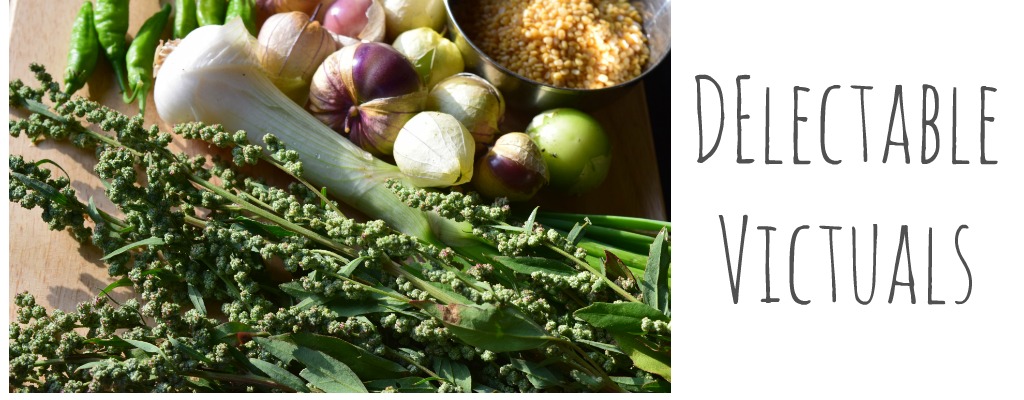Amrit by Purnima Nandkishore

Eating healthy can be quite challenging in today's world where the ready-made food market is crowded with inexpensive junk. Which is one of the reasons I love to cook for my family. To make smart and healthy choices so that eating right becomes a way of life rather than a passing fad.
Amrit: Luscious & Heart-Healthy Indian Meals by Purnima Nandkishore is a well-researched, practical collection of recipes and information that empowers us to eat healthy.
When Purnima asked if I could review the book, I was quite excited, because her introduction immediately struck a chord in me:
"Amrit: Luscious & Heart-Healthy Indian Meals is a MediterrAsian cookbook. The book was published on November 15th, 2009. It is unique, because it is introducing people to fusion cooking with Indian flavors while helping them prevent or control chronic diseases like diabetes, cancer and as the name suggests, cardiovascular diseases. The recipes in this book have been analyzed by a registered dietitian who was on the team of two prominent studies (DASH and OmniHeart). The book's bibliography lists 240 references. Each reference (a book, a scientific paper, or a website) describes how the foods highlighted in the book are proven to improve heart health. The book has been welcomed by Cardiologists, Endocrinologists and Internists across the United States with great enthusiasm."
Fusion cuisine has been my specialization in the last two decades - actively experimenting with various cuisines, incorporating nutritionally valuable ingredients, knowing that flavor and appeal need not be sacrificed in the process of eating healthy. So, naturally, the recipes in Amrit appealed to me right away.
The book has over 50 recipes neatly categorized under Proteins, One-Dish Meals, Non-Indian Dishes, Vegetables, Starches, Condiments and Desserts.
The recipes use Indian flavors extensively and offer creative pairing of some authentic regional Indian staples from the South and North like Nimmakaya Annam (lemon rice) with Mughal Kofta as well as fusion cuisine like the Punjabi Polenta, Flaxseed Chutney, Cilantro Hummus.
 While the spiral-bound book itself is presented in charmingly simplistic ethnic Indian black-and-white design with no pictures of the foods, the companion website
While the spiral-bound book itself is presented in charmingly simplistic ethnic Indian black-and-white design with no pictures of the foods, the companion websiteAmrit For Heart: http://www.amritforheart.com/
provides all the pictures along with a feedback form allowing us to share our input on the recipes.
Each recipe lists the ingredients, steps for preparation, the method ( including a suggestion for presentation), and nutritional analysis, in clear detail. It helps to read the book, which is chock-full of information, cover-to-cover first, to get a feel for the recipes and the general methodology as well as to develop familiarity with the ingredients. Some of the recipes, as Purnima notes, are a labor of love and can take a couple of hours, but, good preparation and understanding of the method makes this an enjoyable experience.
I particularly liked the simple reminder about an ideal dinner plate: http://www.amritforheart.com/dinner_plate.html. We've read about this, we are aware of what's good for us, but, we sometimes fail to adapt our eating habits to conform with this recommended proportion of proteins, starch and fiber.
Amrit is a wonderful resource for people with specific dietary restrictions imposed by medical condition as it provides alternative ingredients and basic nutritional guidelines along with easy-to-prepare recipes. The Pantry section lists tools and equipment as well as essential ingredients used in the recipes. Where possible, brand names are used for products so it is easy to shop for. Many of the ingredients are already staples in my kitchen and are available at Trader Joe's or Whole Foods or New Seasons markets where I live. The Bibliography section is extensive and impressive. And each recipe has a Nutritional Analysis which makes it easy to plan out a balanced meal. I particularly liked the Glossary section with the Latin names and description.
I had to try a few recipes from Amrit right away! Kasha (buckwheat groats) with Kale and Chards & Oats Upmaav are perfect breakfast foods, or even a light yet wholesome dinner. The flavors are flexible and can be adjusted to taste (which I did). Instead of buckwheat groats, which I didn't have handy, I substituted Bulgur, adjusting cooking time as needed.
The very first recipe - Baked Salmon Badshahi Rawas - seemed like a wonderful dinner entrée and here is how it turned out in my kitchen, thanks to Amrit!

As Purnima notes, Amrit is put together especially to help people of South Asian origin prevent heart diseases and enjoy a delicious meal at the same time. She recommends using this book as a learning tool - a stepping stone into exploring and adapting a heart-healthy diet for life.
Labels: book, fusion, indian, miscellaneous




1 Comments:
At 9:47 AM, Nima said…
Nima said…
I feel that Amrit found its ideal user in Sheela. She has understood the essence of the cookbook and personalized the recipes in this book with her own cooking style and her family's tastes (as I had hoped the user would do).
The elements of the cookbook and their characteristics have been articulated perfectly, such that the reader of this review can visualize the book and the experience using it, exactly what a review should do.
I invite readers of this blog to send me questions about the book, I will be happy to respond to any queries.
- Purnima
Post a Comment
<< Home